I Was A Pastor At A Megachurch. Then Someone Asked Me A Question That Turned My Life Upside Down.
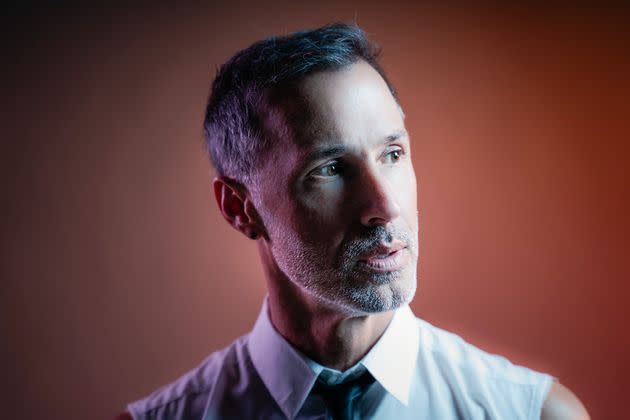
He stood just inside my office. He’d pulled the door closed behind him.
“I need to ask you a question,” he told me.
It was 2015. I was a 44-year-old pastor. My desk was cluttered with set lists for the upcoming church series. That weekend, I was to sing “Beautiful Things” by Michael Gungor — a song I adored. It promised I could be new. There was nothing I wanted more.
“Are you gay, Matt?”
There it was. It surprised me, but I was strangely calm. It was a question I hadn’t been asked since college. A question I’d been haunted by since junior high. The words coursed through my body looking for an answer — an answer I owed only myself.
I was sure his question also lingered in the minds of other colleagues and the community I’d built around myself, even if I had been married to a woman for over 20 years.
Sure, he’s gay. But he’s doing God a solid by living like a straight man — avoiding the “wide path” that leads to eternal darkness.
Most knew it wasn’t their business to ask, but he wanted to know. He had his reasons.
A list of books I’d purchased from Amazon were visible on my profile. One of the church parishioners had seen it and this information had gotten around. The particular book in question was about sexual orientation. I was searching for answers, even though answers weren’t what I needed. Freedom was what I needed.
“Are you?” he asked again. He didn’t seem angry, he seemed uncomfortable, and rightly so. But I wasn’t. I was born into the Church like it was my fucking birthright. I was used to judgment. Churches like mine were renowned for it.
I’d never seen him look unsure of himself. This was a good leader — decisive and strong. He’d always treated me well. I wondered if he’d paused outside my office before entering. I wondered how long it had taken him to find the courage to ask the question we both knew could end my career as a pastor. It felt like someone had put him up to it — even if he believed that someone was God.
“I have never cheated on her — not ever,” I finally said. I didn’t answer his question, but I did tell the truth. There was cheap tension between us — something neither of us was being compensated for.
If I could go back in time, I’d look him directly in the eye and say, “Yeah. I’m gay. So fucking what.”
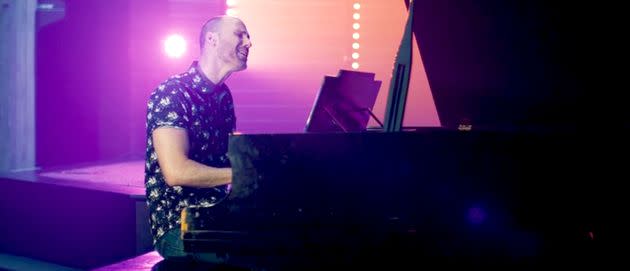
Less than six months later, I would be gone from that church. Not because I was gay, but because I’d been publicly calling attention to our collective lack of love, care and support for the LGBTQ community. As a spiritual community, we needed to do better.
Years earlier, while working at a different church as a young minister, I joined AVOL (AIDS Volunteers of Lexington), serving as a caregiver for queer individuals with HIV and AIDS. Initially, I was questioned by board members who wanted to know if I had ulterior motives of “saving someone’s soul.” I told them I didn’t. After that, they passed me through, and I met Phillip.
I did Phillip’s laundry, took him to doctor’s appointments, and attended his very gay birthday party with my 6-month-old baby girl. I tried to get our church involved in the upcoming annual AIDS walk — a tangible way to put our message of love, hope and service to work. I posted a sign-up sheet in our church lobby. Unfortunately, though not surprisingly, no one from our church showed for the event.
Sixteen years later, I’d grown weary of the church’s reticence and downright opposition to including LGBTQ people in spiritual communities. So, I began having conversations, mostly behind closed doors, and over time, was seen as a sympathizer.
In April 2015, I wrote and published an essay about Caitlyn Jenner, encouraging Christian people to embrace our transgender brothers and sisters by listening to their stories, using their chosen pronouns, and loving them in real ways. Within 48 hours, I received an email from leadership asking that I retract my public statements, which is when I knew it was time to go.
Our church welcomed 8,000 people each weekend. It was a megachurch. Each weekend, I stood before a massive crowd, singing my guts out about the love of God. But I knew if I stayed, I’d never be able to sing over my queer family or safely invite them into that space. I couldn’t do it anymore.
I wasn’t thrown out. Instead, I was told they wouldn’t tolerate my publicly saying things about welcoming queer people. But it was too late. Something had changed in me. I couldn’t make that promise. So, I resigned.
I imagine leadership was relieved.
He walked away. He wasn’t fired.
This was the story. This was how we shared it with the congregation. It never got ugly during this time of transition. I would never have done that, and neither would they. Instead, we walked quietly away from each other.
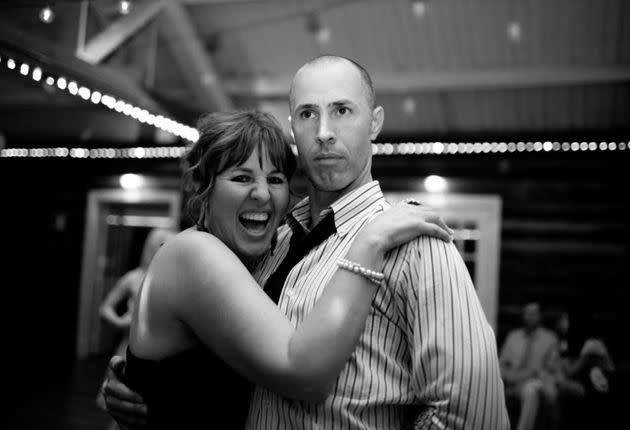
Leaving the church isn’t a badge of honor. In fact, quite the opposite. It’s something I’ve had to make peace with. I waited so long to speak out — too long. But once I left, I made a promise to never again work for any organization that excludes LGBTQ people from their communities.
By the end of that year, I founded a nonprofit focused on survivors of sexual abuse, channeling my personal experiences and past into helping others. I was moving on. A year after that, my first book was published. Things were going well, though, inside, the secret of my sexuality was eating me alive.
The real turning point came in November 2016. A little over a year after leaving the megachurch, I stood at the graveside service of my sister’s funeral. Trina had died of metastatic breast cancer. Having lost all her hair in chemo, she wanted to be buried without her wig because she didn’t want to pretend it hadn’t been a battle. She was herself — always. I wasn’t sure I had ever been.
At the end of the service, everyone headed for their cars. Before leaving the cemetery, I ran back and stood alone before her grave — a hoop of flowers surrounding us. I needed to tell her one last thing.
“I should have told you this before,” I said, “even though I’m sure you already know.” I took a deep breath and closed my eyes. “I think I’m gay, Trina. I’m pretty sure I am, and I don’t know what to do.”
I wiped my tears, told her I loved her, and headed back to my car.
At 45 years old, here are the words I heard ringing out — echoing through every part of me — after my sister’s death:
Life is short, brother. So, get on with it.
For me, this was the beginning.
One year from the day of my sister’s funeral, I shared my coming-out story on social media. To give my family time to process this life change privately, I had waited until after the divorce was finalized to go public.
A comment on my Facebook coming-out post read: Oh yeah, real brave to walk out on your wife and kids! Matt’s a real hero.
The vitriol was painful. It was difficult to watch those I’d considered friends disappear from my life, but I could no longer live a lie dictated by religious extremism.
I understood people’s anger. I hadn’t lived honestly. I had pretended to be someone I wasn’t. Over the years, however, I’ve come to understand this differently. None of us has life figured out. The best we can do is do our best. And within the birthright I’d been given — this straight life I trusted was designed by God — this was my best.
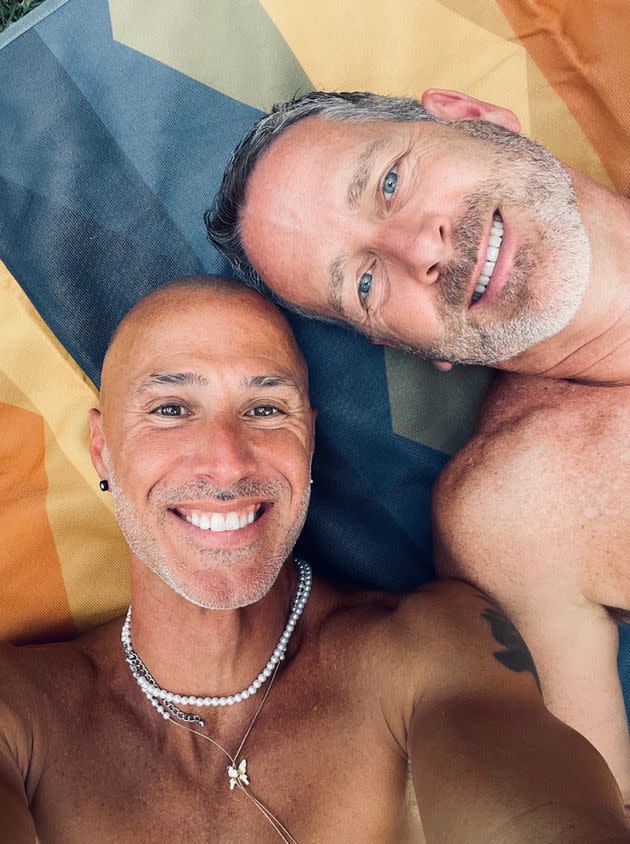
Since coming out, I’ve lost friends and family members I deeply love. I’ve disappointed many people. But this one thing remains the same: I didn’t disappoint myself. What was happening inside me — the lie I was living — needed to come to an end, or it is likely I wouldn’t be here.
I chose me. I don’t regret it.
With the onslaught of negativity and accusation, I kept two thoughts in front of me. The first: I wasn’t happy in my life and believed a change — this change — could bring happiness and peace.
The second: The life I’d been living wasn’t the life I’d imagined or longed for. I wanted something else. Something that fit who I was. This didn’t make me a bad person. It made me human. The choice was mine to make.
So, I made it.
Were there hurdles? Yes. There were major hurdles.
Consequences? There were those too. Major consequences.
I did not make this transition in isolation. A therapist, mentor and friends were all there walking me through. The path forward was challenging, but in my experience, easy decisions often complicate life, whereas doing the hard, yet necessary thing leads to a balanced, manageable and more fulfilling life.
In November 2020, I sat in my friend Daniel’s home, scrolling through Tinder. My 50th birthday was a week away and I was in a terrible funk. What I wanted was a husband — someone who would love me like crazy. I thought it might never happen.
With each swipe, I explained to Daniel why I didn’t want any of these Tinder men and why they probably didn’t want me either. Daniel took my phone, scrolled through a few pictures, and held up a photo of a very handsome guy.
“He looks like a game show host,” I said, feeling real sorry for myself.
Daniel looked back at the picture.
“Boo ... LOOK AT HIM! He’s handsome. His profile is great. He’s a family man. And he’s YOUR AGE!”
“Hi, 911? I’d like to report a personal attack,” I replied.
Daniel rolled his eyes, and without my consent, swiped right on Christopher David Evans. As soon as he did, a digital graphic bounced across the screen of my phone.
“IT’S A MATCH!”
The next day, I woke up to a message in my Tinder inbox from the game show host.
Can I take you out for coffee on your birthday?
I couldn’t have possibly known it at the time, but this was the day my life got made.
Less than nine months after our coffee date, Chris and I were married among friends and loved ones. I’ve never been happier. Never felt more loved. Never been more myself.
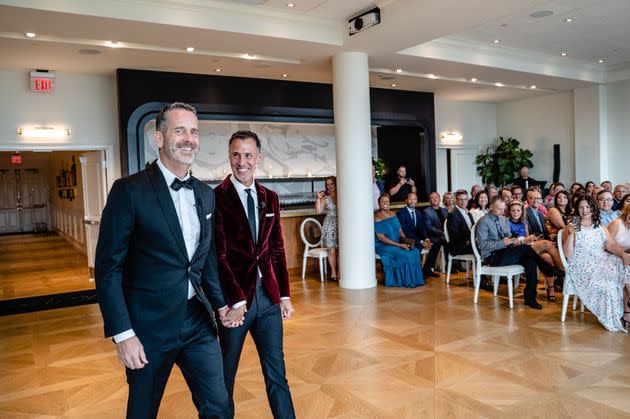
When do we begin searching for a fulfilling life? And when we find it, will all the sacrifices have been worth it?
I can’t answer these questions for anyone else, but I do believe the answers lie within us. They aren’t hiding from us. We are hiding from them. And fear is keeping us stuck.
I wanted a husband. I made the difficult decision to free myself and go looking for one.
Unfortunately, there was a cost to this decision. Everything I was afraid would happen, happened. Things were broken along the way. Thankfully, not all those things stayed broken. Time passes, and with love, healing and hard work, most things get put right. Most — not all.
Life is a complex tapestry of experiences and relationships, including those with family. The process of coming out can cause connections to shift and paths to diverge. I cherish those I’m still in relationship with, and remain grateful for those who were once part of my story.
One day, I believe coming out will be a thing of the past. Pride will no longer be necessary, even as we continue to don our rainbow attire and dance at gatherings to celebrate how far we’ve come — to remember the suffering so many faced so we could live as our true selves. I think we’ll scratch our heads in disbelief at all that was lost in the wake of bigotry, ignorance and hatred.
As a once-closeted gay man who has found freedom, I haven’t found all that went missing in my life. But I did find me.
So now, if I ever hear, “I need to ask you a question, Matt. Are you gay?” I won’t hesitate to respond, “Yes, honey — so damn gay.”
Matt Bays is a speaker, life coach and author celebrated for his memoir ”Finding God in the Ruins” and debut LGBTQ memoir ”Leather & Lace.” With a compelling podcast, ”How to Find (& Keep) a Gay Man,” Matt extends his passion by empowering gay men who desire connection. He joins the ranks of writers such as Anne Lamott and Glennon Doyle in offering readers raw, funny, and insightful compassion for the journey of life. Once a closeted minister, Matt’s unique perspective inspires authenticity and courage. Like and follow on Instagram@mattbayswriter. Or visit his website at mattbays.me. Matt lives in Cincinnati with his husband, Chris.
Do you have a compelling personal story you’d like to see published on HuffPost? Find out what we’re looking for here and send us a pitch at pitch@huffpost.com.

